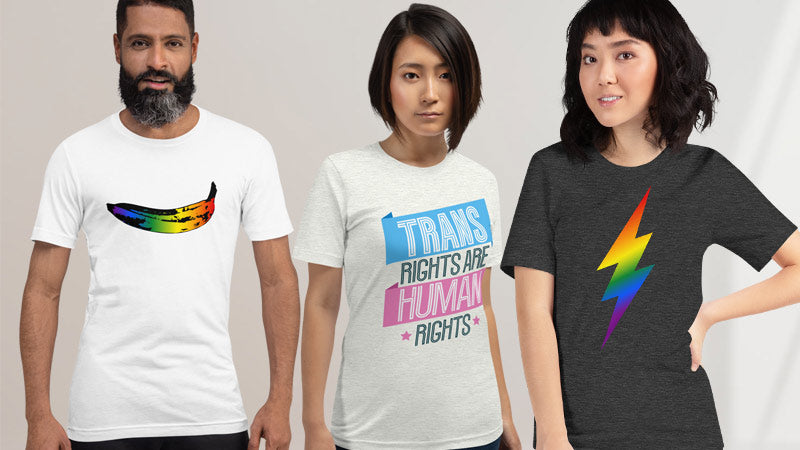International Coming Out Day. What It Means And Why It's So Important

When Is International Coming Out Day
Every year on October 11th, LGBTQ+ communities around the world celebrate International Coming Out Day. It was established in 1988 as a way to promote openness and acceptance for LGBTQ+ people.
For almost every single one of us coming out is a lifelong journey that requires courage, self-reflection and support.
The thing that so many CISHET people (straight and cisgendered, so not trans) fail to recognise or appreciate is how complex it is, and that for so many of us, that final moment of sharing our true selves is the culmination of at least months, and in many cases years, of self exploration, uncertainty, understanding and preparation.
The Benefits Of Coming Out
There are, of course, huge benefits to coming out. Not having to live in secret, or live two lives, leads to a massive reduction in feelings of isolation, anxiety and depression. It increases self esteem and brings all of the joys and pleasures of being able to find your community, talk openly about your lived experiences and find relationships.
It’s been scientifically proven that out LGBTQ+ people have significantly lower stress than those still hiding. In a 2013 study researchers at the University of Montreal found that, “Lesbians, gays and bisexuals who are out to others have lower stress hormone levels and fewer symptoms of anxiety, depression, and burnout”.
All of these things contribute to the queer and trans joy that we feel as that burden is lifted. And finally being able to live openly and authentically can sometimes feel like we have entered a different life.
As one friend told me recently after coming out to their parents following years of internal struggle, “coming out for me wasn’t really about revealing my sexuality any longer, it was about reclaiming my life from the fear I’d allowed to build up."
EXPRESS YOUR AUTHENTIC SELF view the full t-shirt collection
What Does Coming Out Really Mean
This is the thing those outside our community never get. The concept that coming out has so many different facets. And each one has to be treated differently, or nuanced carefully to, hopefully, ensure a positive response. And that it’s an ongoing thing throughout our lives.
Coming out to parents, to wider family, to partners, to potential partners, to existing friends, to new friends, at work, to inlaws. Even just one person has so many different stories. And different levels. While one group may know, another may not. And you have to constantly juggle who you can be open and authentic with.
On top of that we’re starting to understand and accept that in many of us our identity can evolve, or be fluid throughout our lives. So we may have to come out several times to the same people. Which can be exhausting for us and sometimes confusing for them. I’ve come out as bisexual, pansexual, trans, and most recently asexual. It’s a journey.
Beyond the initial disclosure, every new context, job, or relationship can trigger fresh conversations. The process morphs as we navigate different phases of life, revealing the intricacies of identity repeatedly.
And each disclosure carries its own blend of vulnerability and strength, and yes it does foster personal growth, but the fact that it's a continuous and evolving act of self-affirmation makes it exhausting. It’s a testament to the resilience of LGBTQ+ people in the face of a changing world.
Why Do People Still Need To Come Out?
We are constantly told by CISHET people that no one cares. That being open about our sexuality or gender identity isn’t important any more.
This is not only wrong, it’s a dangerous manipulation designed to keep us quiet and keep LGBTQ+ people hidden. Don’t let anyone tell you that it’s not important.
While society has made significant progress, we all know that homophobia, lesbophobia, biphobia and transphobia still exist. The false perception that queer people are fully accepted and integrated into society and nobody cares about our sexuality or gender identity allows those who want to drive us back into secrecy to get the upper hand.
With visibility comes social change. It’s critical for everyone to see LGBTQ+ representation. To normalise us. And particularly important to see successful people from our community. We have to show kids that people like them exist and we have to demonstrate that being gay, lesbian trans non-binary or any other identity isn’t a block to realising your dreams.
We need as many different types of LGBTQ+ people to be visible as possible, so that everyone can see a version of themselves who lives a happy and authentic life.
Why Is Coming Out Still Such A Big Deal?
This is complicated, because there are so many reasons.
Anyone over the age of 40 in the UK would have had parents who grew up at a time when homosexuality was still illegal and homophobic and transphobic attitudes were rife. Believing that you’d be rejected by your family has forced many of us to stay quiet.
On top of that, the Section 28 era between 1988 and 2003 meant that even talking about LGBTQ+ lives and experiences was banned in schools. So there were few opportunities to see positive representation. The ‘othering’ of LGBTQ+ people was clear, and discrimination was validated in law.
For those in certain religious communities there is still much hostility and intolerance and many LGBTQ+ youth are afraid to come out to unaccepting families for fear of rejection, discrimination or even violence. Coming out can jeopardise relationships and support systems. Or worse.
One only has to hear that homeless youth in the UK are disproportionately from the LGBTQ+ community to know the devastating impact simply revealing your true self can have.
In recent years, certainly in the UK and US, the rise in conservative puritanism within right wing populist governments, that has driven culture wars which have been further stoked by religious fundamentalists has caused many LGBTQ+ folk to think twice before coming out.
We’ve all seen the rise in intolerance in the media, and increased homophobic/transphobic hate crimes have shown the effect of the media trans panic, and now queer panic.
Of course people are so much more accepting than they were even 10 years ago. But for many, coming out remains challenging due to persistent societal and cultural biases and fears. Despite progress, discrimination lingers, fueling anxiety about acceptance and safety.
The fear of losing our family, friends and opportunities can grip us. Whether those fears would materialise or not is irrelevant, the perception is enough to leave us in hiding.
However, the courage of those who come out continues to chip away at these barriers, inspiring hope for a future where authenticity is met with universal understanding and respect.
Coming Out Isn’t Just About Us
As I was scrolling through Instagram recently I came across a beautiful post from a woman whose three children had all come out to her in different ways. And it was interesting because it told the coming out story from a different perspective. And it’s important to remember that your coming out story has many sides.
One child had carefully prepared the ground for her when he was 13 and wanted reassurance and confidentiality. Which put pressure on her because she was uncomfortable keeping this secret from her husband. And it made her feel isolated and sparked feelings of loneliness.
The second child came out over the phone as an adult and wanted to talk about her feelings and processes and needed some reassurance. The third did it by text message and didn’t want reassurance or comfort. And she admitted that each one took her a long time to come to terms with.
This gave me a new perspective. And it made me realise that when we share our secret with someone to unburden ourselves, especially when it’s a partner, parent, or family member, we put part of the weight on them.
They may be overjoyed that you feel comfortable to share, but also may be thrown to suddenly discover that we are not who they thought we were, and that may cause them to question themselves.
They may need to be able to talk to someone about it to help them process it and come to terms with it over days, months or years. It's unlikely to happen overnight. So we have to give them the same support that, we hope, they will give us.
Coming Out Advice
Coming out can be scary, but you don't have to do it alone. Here are five tips if you're considering coming out:
1. Make sure you're safe. Having a support system is crucial, whether it's friends, a counsellor, or an LGBTQ+ organisation. Don't come out if you fear harm or abuse. Your safety comes first.
2. Reflect on your reasons. Make sure you're coming out for yourself, not others. You get to decide if, when, and how to come out. Don't let anyone pressure you.
3. Start small. Come out first to trusted allies who you think will be supportive. Their acceptance can help give you confidence.
4. Be patient. Some people will need time and education to understand. Give them space to process. What matters most is living authentically.
5. Look ahead. Focus on the freedom of living as your true self, instead of fear. Envision the community you're joining and the supportive future you can build.
You are on a journey to accepting yourself. However it unfolds, and wherever it leads, you aren't alone. We're all rooting for you!
International Coming Out Day in and of itself is really just a vehicle to draw attention to the complexities of this life event. And to allow us to say that despite progress, there is still discrimination and hostility towards our community.
There are so many wonderful and warming stories now. And it’s awful when we hear stories where people express grief, sadness or anger. But humans have evolved by being suspicious
Resources
The Trevor Project Coming Out Handbook
This is an incredibly detailed and in-depth guide to coming out and helping people understand their identity. Highly recommended.
https://www.thetrevorproject.org/resources/guide/the-coming-out-handbook/
LGBT Foundation
https://lgbt.foundation/comingout
Stonewall
https://www.stonewall.org.uk/young-futures/lgbtq-support/coming-out
Coming Out In Later Life
Sage https://www.lgbtagingcenter.org/resources/resources.cfm?s=31
Restless https://restless.co.uk/health/healthy-mind/coming-out-later-in-life-steps-to-help-you-through/












